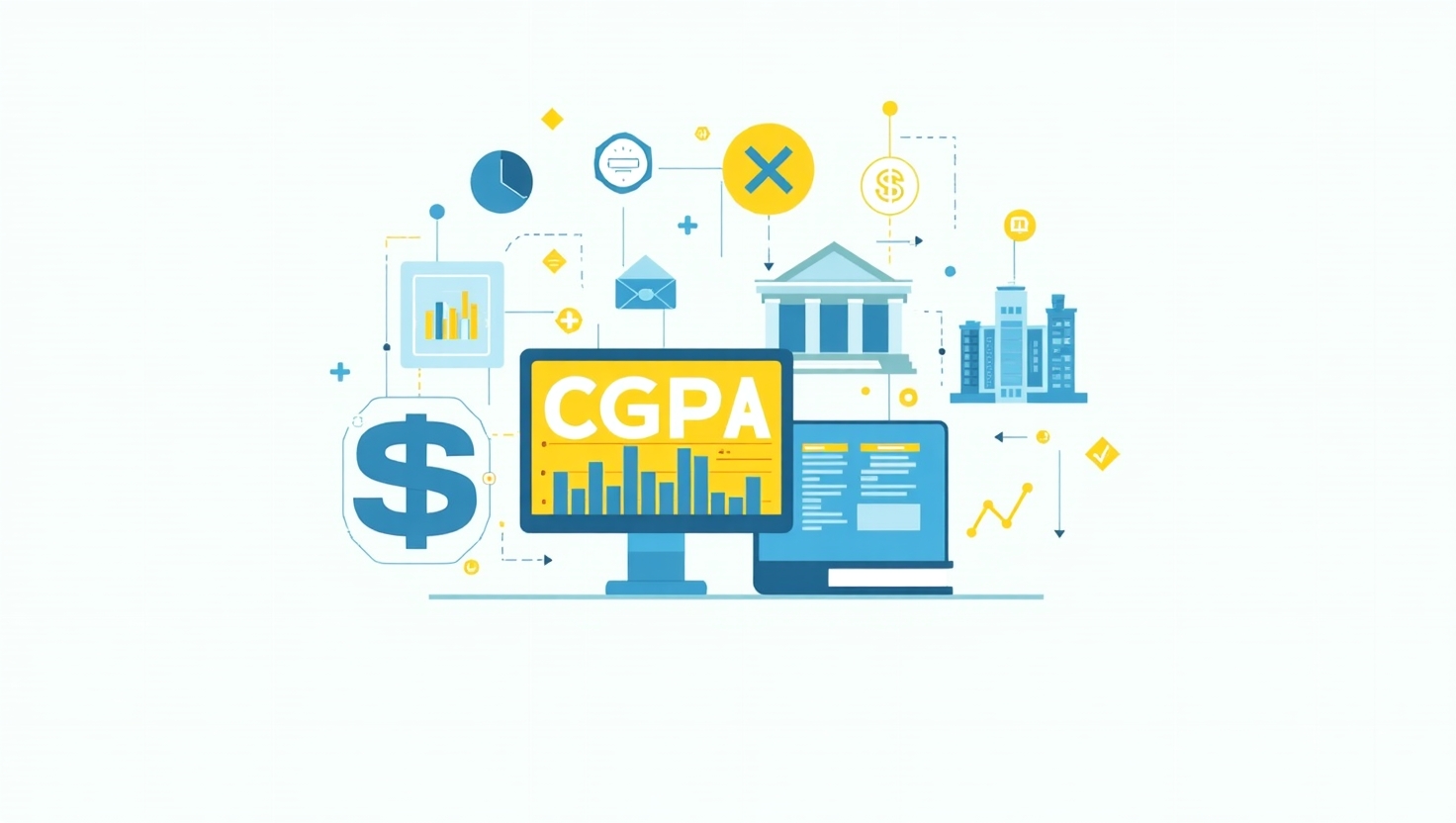CGPA Explained: Meaning, Calculation & Importance

Strong 8k brings an ultra-HD IPTV experience to your living room and your pocket.
Ever sat down with your report card and wondered what that mysterious "CGPA" actually means? You’re not alone. Whether you’re a student, parent, or recruiter, understanding CGPA is crucial. It influences everything from academic standing to career opportunities. In this article, we’ll break it down piece by piece—what CGPA is, how to use CGPA calculator for it's calculation, and why it really matters in today’s academic and professional world.
What is CGPA?
CGPA stands for Cumulative Grade Point Average. It’s a standardized measure used to evaluate a student’s overall academic performance over a specific time—usually a semester, year, or entire program. Think of CGPA as the average of all your grades bundled into one neat number.
Instead of listing every subject’s individual score, educational institutions often use CGPA to simplify the performance overview. This makes it easier to understand where you stand academically in just a glance. It's not just a random figure—it reflects consistency, dedication, and academic understanding across various subjects.
But let’s be clear: CGPA isn’t a percentage but you can convert CGPA to percentage easily. That’s a common confusion. A CGPA of 9 doesn’t mean you scored 90%. Depending on the grading scale used, that 9 might translate differently when converted into a percentage. Institutions often provide conversion formulas, and these can vary between boards and universities.
Origin and Global Use of CGPA
CGPA is believed to have evolved from the GPA system, popularized in the United States, and has now become a global standard in educational evaluation. Countries across the globe, from India to Canada, now implement some form of the CGPA or GPA system to assess academic performance.
In India, the Central Board of Secondary Education (CBSE) officially introduced CGPA in 2009 to reduce academic pressure and encourage holistic learning. The idea was to move away from rigid percentage-based evaluation and adopt a more student-friendly, grade-based approach.
Across Europe and Asia, many countries now use or acknowledge CGPA when comparing academic credentials. It’s particularly useful in today’s global academic environment, where students frequently migrate for education. Whether applying for universities abroad or internships, having a CGPA makes comparison straightforward.
Why is CGPA Important?
Academic Significance of CGPA
Let’s face it—grades matter. And CGPA sums them all up. In schools and colleges, CGPA is the yardstick for academic success. It helps institutions determine academic rankings, eligibility for scholarships, and even admission into advanced programs.
Many universities and colleges set minimum CGPA thresholds for certain courses. For example, a student aiming to switch to an honors program might need a CGPA of at least 8.0. Similarly, postgraduate programs often shortlist applicants based on their undergraduate CGPA.
Even within a single academic institution, CGPA acts as a filter for opportunities. Students with higher CGPAs are often preferred for exchange programs, internships, and leadership roles in student bodies. That’s because a consistently high CGPA signals discipline, perseverance, and academic capability.
Role of CGPA in Career and Job Opportunities
Think CGPA only matters in college? Think again. Employers too look at CGPA—especially if you’re a fresher with little to no work experience. In job applications, CGPA acts as a benchmark that recruiters use to shortlist candidates. It gives them a rough idea of a candidate’s intelligence, dedication, and ability to handle pressure.
Top recruiters, especially in competitive fields like consulting, finance, and tech, often set CGPA cutoffs during campus placements. Some companies won’t even consider candidates below a certain CGPA—commonly around 7.0 or 7.5.
But it doesn’t stop there. When applying for higher studies abroad—say an MBA or Master’s degree—your undergraduate CGPA plays a big role in the admissions process. Many top universities in the US, UK, and Australia consider CGPA when evaluating academic transcripts. A good CGPA can sometimes even compensate for an average entrance exam score.
Moreover, in the long run, a good CGPA builds a strong foundation. It helps open doors to top universities, competitive internships, and even scholarships—all of which shape your career trajectory in significant ways.
How is CGPA Calculated?
The Standard Formula for CGPA
Now, here’s where it gets slightly technical—but not too scary, promise. The basic formula to calculate CGPA is:
CGPA = (Sum of Grade Points of all Subjects) / (Total Number of Subjects)
Each subject carries a certain number of credits or weightage. When calculating CGPA, these weights are sometimes considered in the form of weighted averages. But in most school systems, especially in high school, the calculation remains straightforward.
For example, if you have five subjects and your grade points are 9, 8, 7, 9, and 10 respectively, then your CGPA is:
CGPA = (9 + 8 + 7 + 9 + 10) / 5 = 8.6
Pretty simple, right?
You can also calculate CGPA from GPA in a simple way.
CGPA vs GPA – What’s the Difference?
At first glance, CGPA and GPA might look like twins. But they’re not quite the same.
GPA (Grade Point Average) refers to the grade average for a single semester or term.
CGPA (Cumulative Grade Point Average) is the average of all GPA scores across multiple semesters.
In essence, GPA is like a snapshot of your performance in one term, while CGPA is the entire photo album of your academic journey. That’s why CGPA holds more weight in long-term academic and career decisions—it reflects your overall consistency and not just one good (or bad) term.
Example Calculation for Better Understanding
Let’s say you’ve completed 3 semesters and your GPA scores were:
Semester 1: 8.0
Semester 2: 7.5
Semester 3: 8.2
Then, your CGPA would be:
CGPA = (8.0 + 7.5 + 8.2) / 3 = 7.9
If each semester had different credit hours, you would use a weighted average, giving more importance to semesters with higher credits.
Advantages and Limitations of CGPA System
Benefits for Students and Institutions
One of the biggest advantages of the CGPA system is that it reduces student stress. Instead of obsessing over decimal-point percentages, students are grouped into broader bands or grades. This allows for a more holistic evaluation and encourages deeper learning rather than rote memorization.
Here are a few more benefits:
Standardization Across Boards & Countries: CGPA brings uniformity, making it easier to compare academic records globally.
Encourages Consistency: Since CGPA reflects cumulative performance, students are motivated to perform well in every term.
Supports Fair Evaluation: It balances out anomalies in one-off exams and focuses on continuous performance.
Simplifies Recruitment & Admissions: For employers and institutions, CGPA provides a quick overview of academic competence.
Furthermore, institutions benefit because CGPA allows them to benchmark students, track performance over time, and generate insights for curriculum improvements.
Challenges and Criticisms of the CGPA System
Despite its advantages, the CGPA system isn’t perfect. Critics often argue that:
It Lacks Precision: Two students with slightly different marks may end up with the same CGPA, making it hard to distinguish between top performers.
Grade Inflation is a Risk: Since students are grouped into bands, there's a tendency for evaluators to give higher grades, diluting academic rigor.
Complex Conversion Issues: When applying abroad, CGPA needs to be translated into a GPA or percentage, which may not always be straightforward.
Conclusion
CGPA isn’t just a number on your report card—it’s a reflection of your academic journey. From school classrooms to top-tier universities and even in job interviews, your CGPA can influence how others perceive your dedication, consistency, and performance. It offers a standardized way to gauge academic ability and makes it easier for institutions and recruiters to compare candidates from different backgrounds.
However, while CGPA is undeniably important for career boost, it's crucial to remember that it's not the only thing that matters. It doesn’t measure creativity, leadership, or emotional intelligence—all of which play massive roles in your personal and professional success. So yes, aim for a high CGPA, but also focus on developing well-rounded skills.
In a world increasingly driven by metrics, CGPA remains a vital tool. Understanding how it works, how it's calculated, and how it's used globally can give you an edge—whether you're planning your academic future, applying for jobs, or trying to get into your dream university.
At the end of the day, CGPA is a chapter in your story—not the whole book. Own it, but don’t be defined by it.
Note: IndiBlogHub features both user-submitted and editorial content. We do not verify third-party contributions. Read our Disclaimer and Privacy Policyfor details.


